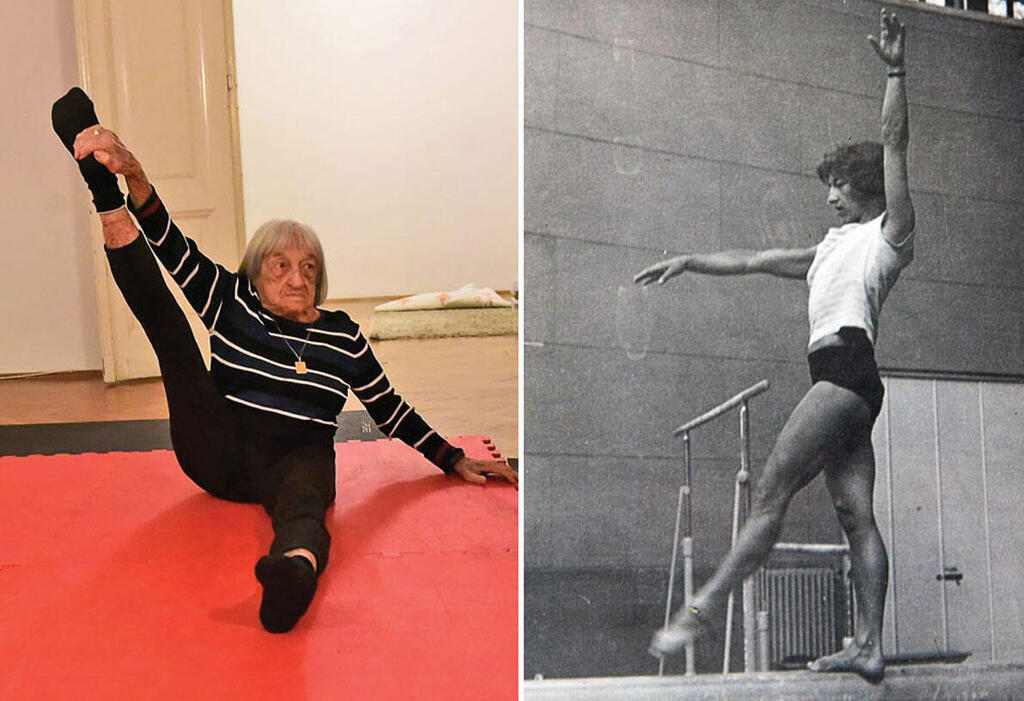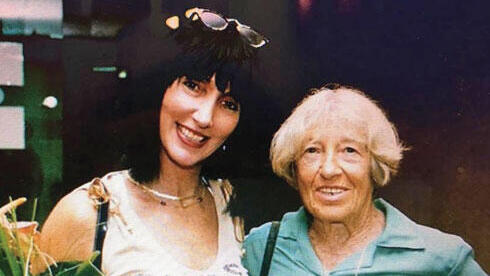Getting your Trinity Audio player ready...
"I don't exercise regularly anymore, but yesterday we were at the home of my son Rafael's friend, who is a fitness trainer, and I exercised with her. I did a leg extension exercise without difficulty and held it in my hand. Like a sitting spaghetti."
Famous Jewish gymnast Agnes Keleti said this in an interview with LaIsha magazine four years ago, when she celebrated her 100th birthday. In exactly one week, she was supposed to celebrate her 104th birthday, but on Wednesday night her eyes closed for the last time. The Holocaust survivor who became the "mother of Israeli gymnastics" died in a hospital in her homeland of Hungary, after suffering from heart failure.
"The deterioration in Agnes' health was rapid," shares Chaya Halperin, star of the legendary show "Fitness Hour" and former head of dance studies at Wingate Institute-The National Institute For Sport Excellence, who was considered one of Keleti's closest friends.
"In recent years, she was generally in good health. She did not suffer from any pain or special difficulties. Ten days ago, her son Rafael, who cared for and treated her with extraordinary devotion, told me that she had pneumonia and was rushed to the hospital after she had difficulty breathing. The tests they performed on her found that she was suffering from heart failure. I already understood then that she probably would not make it out of this," Halperin said.
"Last night I knew that this was the end. Rafael called and said, 'Chaya, you can whisper words of farewell in my mother's ear.' I did not know what condition she was in and what she would understand, but I reminded her, among other things, of the wonderful days when we used to swim together. Later, Rafael wanted to play her songs that she liked and asked me if I knew a song that she particularly liked. I sent him the song by HaGashash HaHiver, 'I Have a Day, a Holiday.' She loved this song very much. She also once put together a spectacular performance with her students at Wingate to the tune of this song, at a ceremony held in the presence of then-President Yitzhak Navon."
Keleti is considered the most successful Jewish athlete ever, and one of the greatest gymnasts of all time. She won 10 Olympic medals for her native Hungary – five of them gold.
(Agnes Keleti warms up at age 100)
She was born in Budapest in 1921 to a wealthy Jewish family. At the age of four, she began practicing swimming and gymnastics at a Jewish sports club. Later, she focused on playing the cello, but at the age of 16 she returned to gymnastics and a year later she was already the Hungarian champion.
During World War II, she managed to acquire fake documents, have a fictitious marriage ( to Hungarian athlete Istvan Szárakan) and lived under a false identity as a worker in a munitions factory. Her father died in Auschwitz, and her mother and sister were saved with the help of Raoul Wallenberg. When she returned to training, Keleti was already 24 years old, an age that is considered very old in the sport today. Despite this, she became the Hungarian gymnastics champion and retained the title for an entire decade - after also winning titles at the European Championships where she represented the Hungarian team at the 1948 London Olympics and where she fell and was injured; at the 1952 Helsinki Olympics - where she won four gold medals, a silver medal in the team competition and two bronze medals; and at the 1956 Melbourne Olympics where she won six more medals, four of which were gold.
Keleti is ranked as the 10th Olympic athlete of all time and was inducted into the World Gymnastics Hall of Fame.
During the Melbourne Olympics, Keleti was granted political asylum in Australia, following the Soviet invasion of Hungary. A year later, she arrived in Israel and took part in the fifth Maccabiah Games. She decided to settle in Israel, married Robert Biro, a Hungarian-born physical education teacher, and had two sons: Daniel, whom she gave birth to at the age of 42, and Rafael, whom she gave birth to at the age of 44.
In Israel, in 1957, the field of apparatus gymnastics was still in its infancy. Keleti took part in the establishment of the unit for nurturing outstanding young gymnasts at the Wingate Institute and served as head coach. For about 30 years, she trained generations of gymnasts and teachers and promoted the field of apparatus gymnastics in Israel.
"I first met Agnes when I was 9 years old," says Halperin. "She came to Israel and was looking for talented gymnasts. At the time, I was training for Hapoel Haifa and she added me to the Israeli team she had established. I continued to train with her, and in my early 20s, after I started studying dance at the Jerusalem Academy, she asked me to be her assistant at Wingate."
From teacher and student, you became colleagues and friends?
"Exactly. Very good friends. Later on, we also lived next door in Herzliya and, as I mentioned, we would swim together. She was an amazing cook and used to invite me to lunch at her place. She was a charming woman with a special sense of humor. Sometimes she would make me laugh without even meaning to. Mainly because she would literally translate sentences from Hungarian into Hebrew. For example, in our country they say 'she's fat like a cow,' but she would say: 'Look how fat she's gotten, like a stuffed pigeon.' Or if we were sitting in a row on a low beam before class, she would say, 'Look at these, sitting like birds on a telephone wire.'"
What was your first impression of her when you met her as a child?
"I actually heard about Agnes before I met her. My relatives who lived in Australia visited us in Israel and brought me and my brother a photo album from the Olympics held in Melbourne as a gift. My older brother showed me a picture of her doing a handstand and said: 'Her name is Agnes Keleti and she is Jewish.' So when I met her face to face, when she came to look for young talent, I was very excited. It was like seeing a fairy tale. When I started training with her, it was very important to me to please her. Not because she was tough. She simply had very specific demands and she made you feel like you wanted to excel so that she would be proud of you."
Being born into a family with good genes
In 2006, Keleti was widowed. Her eldest son moved to Australia and her younger son moved to Hungary. When she was 96, her younger son, Rafael, a fashion designer by profession, decided to move her into an apartment next to his in Budapest. "In recent years, I felt that she was lonely and depressed and I decided to bring her to me and take care of her closely," she explained in an interview with journalist Tzipora Roman for LaIsha in 2021. "It was the smartest thing I ever did in my life."
From the moment she returned to Hungary, Keleti became a star. The media there hounded her and the citizens showered her with admiration. Six years ago, the Hungarian government decided to award monthly royalties to their country's top athletes based on the number of Olympic medals they won for the country. "Mom brought 10 medals, and according to that she receives very respectable sums," shared her son, Rafael.
(Agnes Keleti's performances in the Olympics)
Hungarians continued to see Keleti as a Hungarian even during the decades she lived in Israel. In 1991, she was chosen as one of the 12 greatest athletes in Hungarian history. She is also considered an icon internationally, and in 2001 she was inducted into the Olympic Hall of Fame at a ceremony held in New York. Of course, she was also highly respected in Israel: In 2017, she received the Israel Prize, and on the occasion of her 100th birthday celebrations, the Israeli Olympic Committee, in cooperation with the Women's Artistic Gymnastics Association, decided to name the Israeli Gymnastics Championships, starting in 2021, after her.
Get the Ynetnews app on your smartphone: Google Play: https://bit.ly/4eJ37pE | Apple App Store: https://bit.ly/3ZL7iNv
In the interview, Keleti was of course asked for her secret to longevity. She replied: "Good sleep, proper nutrition, avoiding alcohol and smoking – although I smoked for one year – diligence and perseverance, sports activity and maintaining fitness so as not to degenerate physically and mentally, and a positive outlook on life. But first and foremost, you need luck to be born into a family with good genes. Last year we met with a genealogist who made us a tree of life, and she found that already in the last century there were people in our family who were 100 years old. And on top of all that, the big secret is to love life."
Chaya, is there anything she regretted during her life? Something she wanted and didn't get?
"I think the only thing is that she didn't get to be a mother to a daughter. She became a mother at an older age, had two children after the age of 40, and that's really not obvious. But she really wanted to have a daughter and even had a name for her: 'Iris.' Still, all in all, she had a very long and beautiful life. Although not always easy, definitely significant and full of achievements. Happily, even in the last years of her life she didn't suffer. She was healthy, strong and knew how to make the most of life."




